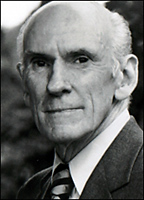Toward a Nuclear Weapons-Free World:
An Interview with Alan Cranston
By Scott London
Former California senator Alan Cranston was one of the chief architects behind the recent statement by 60 generals and admirals calling for the elimination of nuclear weapons. Since his retirement from the Senate in 1991, Cranston has served as Chairman of the Gorbachev Foundation of the United States and its offshoot, the State of the World Forum (which sponsored the joint statement). I asked Cranston about the initiative and his long-standing commitment to issues of peace and nuclear disarmament.
Scott London: This joint statement is the latest in a series of efforts you have made over the years toward nuclear disarmament. When did you first begin to realize the importance of this issue to American security and world peace?

Alan Cranston
Alan Cranston: I was born the year World War I began. I served in the armed forces during World War II. I was also a foreign correspondent for the International News Service and covered Hitler and Mussolini. So my interest in issues of war and peace goes far back. But since Hiroshima and Nagasaki, I've been especially concerned about the threat of nuclear weapons. I met Albert Einstein back then, and he educated me in the fact that nuclear weapons could exterminate all life on this planet. That was something that I felt deserved attention and I have worked on it in various ways ever since.
London: Do you see your current work with the Gorbachev Foundation as an extension of what you did during your 24 years in the Senate?
Cranston: Yes. In the Senate, I focused on arms reduction efforts with the Soviet Union and that led to a friendship with Mikhail Gorbachev. He left office about the same time I did. He set up a foundation as a base of operations, of which I became Chairman in the United States. I'm now working with Gorbachev and other world leaders on trying to find ways to promote a more orderly world in the wake of the Cold War. One of our projects involves global security and an effort to lead the world toward the abolition of nuclear weapons, which I think can be accomplished.
London: What are some of the practical steps that could be taken toward that end?
Cranston: Abolition is a long way away, but we can take a number of steps now. The first is to avow that our goal is abolition. Secondly, we ought to negotiate with the former Soviet Union to dramatically reduce the stockpiles we each have, and then draw other nations into the process. We must also take those weapons that remain off alert.
London: President Clinton and the Russian leadership under Boris Yeltsin have taken some initiatives along these lines.
Cranston: Yes, we have stopped aiming at each other with nuclear weapons. Symbolically, it's good. But, substantively, it does not mean much because you can reach re-target in about ten seconds. Therefore, we have to take the weapons off alert, separate the war-heads from the missiles that carry them in such a way that it would take a while to put them back together. This way we can reduce the risk of an accident or a rash decision in a moment of crisis that might lead to the use of nuclear weapons.
London: Critics maintain that we need to retain a certain number of nuclear weapons to deter potential terrorists and rogue states. Do you agree?
Cranston: No, I totally disagree with that. Deterrence depends on having a somewhat rational opponent. Deterrence isn't going to stop someone who is not rational and cautious in the use of violence.
Our military leaders say that the major threat to the security of the United States and to world peace today is the proliferation of nuclear weapons and the danger that they will fall into the hands of terrorists or rogues. As long as these weapons exist, there will be the danger of a leak that permits rogues or terrorists to get their hands on them and then use them.
Our military leaders also point out that you don't need nuclear weapons to deal with an irrational foe that might possess one or two weapons. They say that you can deal with them better by overwhelming conventional strength. How do you use a nuclear weapon against a terrorist when you don't know who the terrorist is, or where the terrorist might be? You can't do it.
London: Is it possible that a rogue nation might develop a nuclear capacity?
Cranston: Yes, it's possible. But, again, the military people with whom I have talked say that you don't need a nuclear weapon to deal with that. If we don't have nuclear weapons permitted anywhere in the world, it's going to be tough for a rogue to get them. They can't steal them from somewhere because they aren't there. If they try to create them and we have adequate surveillance and intelligence going on, we will detect them probably before they get any. If they get one or two, that's very unfortunate. But we can deal with it when we discover they have them by means other than nuclear weapons.
London: Do you feel the United States needs to take the lead in attempting to rid the world of nuclear weapons?
Cranston: Yes. The United States is the only nation that has ever used nuclear weapons. It's the nation that invented nuclear weapons, (with the help of Einstein and other physicists from other countries). And we are the strongest nation on earth at the moment. So it is our responsibility to take the lead and try to develop a more orderly and peaceful world.
This interview was adapted from the radio series "Insight & Outlook," hosted by Scott London. It aired on National Public Radio stations in the United States the last week of December 1997.
